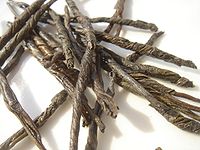
Effect of the bacterial growth phase and coculture conditions on the interaction of Acanthamoeba castellanii with Shigella dysenteriae, Shigella flexneri, and Shigella sonnei
Sign Up to like & getrecommendations! Published in 2019 at "Journal of Basic Microbiology"
DOI: 10.1002/jobm.201900075
Abstract: Shigella species and Acanthamoeba castellanii share the same ecological niches, and their interaction has been addressed in a limited number of research. However, there are still uncertain aspects and discrepant findings of this interaction. In… read more here.
Keywords: phase; acanthamoeba castellanii; shigella; number ... See more keywords

Visualizing the interaction of Acanthamoeba castellanii with human retinal epithelial cells by spontaneous Raman and CARS imaging
Sign Up to like & getrecommendations! Published in 2018 at "Journal of Raman Spectroscopy"
DOI: 10.1002/jrs.5296
Abstract: Improved understanding of the mechanism of nutrient's uptake can enable targeted manipulation of nutrient sensing pathways in medically important pathogens to a greater degree than is currently possible. In this context, we present the use… read more here.
Keywords: human retinal; castellanii; acanthamoeba castellanii; spontaneous raman ... See more keywords

Effect of oxidative stress on vital indicators of Acanthamoeba castellanii (T4 genotype)
Sign Up to like & getrecommendations! Published in 2018 at "Parasitology Research"
DOI: 10.1007/s00436-018-5992-6
Abstract: Acanthamoeba has 22 genotypes with the T4 genotype being the main causative agent of amoebic granulomatous encephalitis and keratitis. Because the molecular mechanisms of the immune defenses of neutrophils and macrophages against histoparasites are based… read more here.
Keywords: stress vital; castellanii genotype; effect oxidative; acanthamoeba castellanii ... See more keywords

Oleic acid–conjugated silver nanoparticles as efficient antiamoebic agent against Acanthamoeba castellanii
Sign Up to like & getrecommendations! Published in 2019 at "Parasitology Research"
DOI: 10.1007/s00436-019-06329-3
Abstract: Acanthamoeba castellanii belonging to the T4 genotype is an opportunistic pathogen which is associated with blinding eye keratitis and rare but fatal central nervous system infection. A. castellanii pose serious challenges in antimicrobial chemotherapy due… read more here.
Keywords: acanthamoeba castellanii; oleic acid; acid conjugated; conjugated silver ... See more keywords

Antiamoebic activity of 3-aryl-6,7-dimethoxyquinazolin-4(3H)-one library against Acanthamoeba castellanii
Sign Up to like & getrecommendations! Published in 2020 at "Parasitology Research"
DOI: 10.1007/s00436-020-06710-7
Abstract: Acanthamoeba castellanii is a free-living amoeba which can cause a blinding keratitis and fatal granulomatous amoebic encephalitis. The treatment of Acanthamoeba infections is challenging due to formation of cyst. Quinazolinones are medicinally important scaffold against… read more here.
Keywords: aryl dimethoxyquinazolin; castellanii; acanthamoeba castellanii; dimethoxyquinazolin one ... See more keywords

The amoebicidal activity of three substances derived from benzothiazole on Acanthamoeba castellanii cysts and trophozoites and its cytotoxic potentials.
Sign Up to like & getrecommendations! Published in 2021 at "Acta tropica"
DOI: 10.1016/j.actatropica.2021.105981
Abstract: Acanthamoeba species are free-living amoebae isolated from many ecological areas such as swimming pools, dams, lakes, soil, and air filters. These amoebae are usually causing granulomatous amebic encephalitis and amebic keratitis in immunosuppressive individuals. In… read more here.
Keywords: active substances; three substances; substances derived; acanthamoeba castellanii ... See more keywords

Photodynamic treatment induced membrane cell damage in Acanthamoeba castellanii Neff
Sign Up to like & getrecommendations! Published in 2020 at "Dyes and Pigments"
DOI: 10.1016/j.dyepig.2020.108481
Abstract: Abstract Photodynamic therapy (PDT) is a potentially non-invasive therapeutic strategy that involves the use of a photosensitizing agent molecule capable to absorb light at a specific wavelength and to transfer the absorbed energy to generate… read more here.
Keywords: induced membrane; acanthamoeba castellanii; photodynamic treatment; castellanii neff ... See more keywords

Legionella pneumophila decreases velocity of Acanthamoeba castellanii.
Sign Up to like & getrecommendations! Published in 2017 at "Experimental parasitology"
DOI: 10.1016/j.exppara.2017.07.013
Abstract: Acanthamoeba castellanii is a free-living amoeba commonly found in aquatic environment. It feeds on bacteria even if some bacteria resist amoebal digestion. Thus, A. castellanii is described as a Trojan horse able to harbor pathogenic bacteria.… read more here.
Keywords: castellanii; velocity; acanthamoeba castellanii; legionella pneumophila ... See more keywords

Acanthamoeba castellanii interactions with Streptococcus pneumoniae and Streptococcus pyogenes.
Sign Up to like & getrecommendations! Published in 2017 at "Experimental parasitology"
DOI: 10.1016/j.exppara.2017.08.005
Abstract: Among the genus Streptococcus, S. pyogenes and S. pneumoniae are the major causes of pharyngitis, impetigo, pneumonia and meningitis in humans. Streptococcus spp. are facultative anaerobes that are nutritionally fastidious, yet survive in the environment and target… read more here.
Keywords: streptococcus pyogenes; pyogenes pneumoniae; acanthamoeba castellanii; interactions streptococcus ... See more keywords

In vitro activity of Camellia sinensis (green tea) against trophozoites and cysts of Acanthamoeba castellanii
Sign Up to like & getrecommendations! Published in 2020 at "International Journal for Parasitology: Drugs and Drug Resistance"
DOI: 10.1016/j.ijpddr.2020.05.001
Abstract: The effect of Camellia sinensis (green tea) on the growth of Acanthamoeba castellanii trophozoites was examined using a microplate based-Sulforhodamine B (SRB) assay. C. sinensis hot and cold brews at 75% and 100% concentrations significantly… read more here.
Keywords: sinensis; green tea; microscopy; acanthamoeba castellanii ... See more keywords

Random encounters and amoeba locomotion drive the predation of Listeria monocytogenes by Acanthamoeba castellanii
Sign Up to like & getrecommendations! Published in 2022 at "Proceedings of the National Academy of Sciences of the United States of America"
DOI: 10.1073/pnas.2122659119
Abstract: Significance Acanthamoeba are considered among the most predominant and efficient microscale predators in environments such as soil and natural water systems. While it is known that Acanthamoeba castellanii employ a “backpacking” strategy to trap and… read more here.
Keywords: predation; random encounters; listeria monocytogenes; amoeba locomotion ... See more keywords